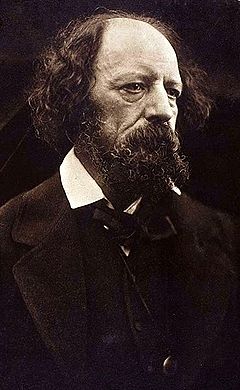Alfred Lord Tennyson Biography
Alfred Lord Tennyson (1809 – 1892)
 Alfred Tennyson became the most popular poet of the Victorian age. With royal patronage, his poetry helped define an era. In the Twentieth Century his influence waned. However, he ranked second in the list of the Oxford Dictionary of Quotations, after Shakespeare.
Alfred Tennyson became the most popular poet of the Victorian age. With royal patronage, his poetry helped define an era. In the Twentieth Century his influence waned. However, he ranked second in the list of the Oxford Dictionary of Quotations, after Shakespeare.
He was born August 6th, 1809, at Somersby, Lincolnshire; he was the fourth of twelve children. Despite having wealthy relatives, the Tennyson’s lived in relative poverty.
His family had a long history of minor mental illnesses. Several brothers had epilepsy, which in Victorian times was feared because it was difficult to treat. Also his father, under the influence of heavy drinking, grew increasingly mentally unstable and physically weak.
In 1827, he followed two elder brothers to Trinity College, Cambridge. This offered him an opportunity to explore his intellectual and poetic pursuits. In 1828, he won the Chancellor’s Gold Medal for his poem Timbuctoo. This helped raise his profile and reputation as a poet.
He became close friends with Arthur Hallam, Hallam was an important influence on Tennyson, encouraging him in his literary endeavours. His early death in 1833, when Tennyson was just 22, was quite a shock. But, it led to some of Tennyson’s most thoughtful and memorable poetry – such as: In Memoriam, Ulysses and Tithonus. After the death of Prince Albert, In Memoriamwas a favourite of Queen Victoria, who requested an interview with Tennyson because she was so impressed with the poem.
I hold it true, whate’er befall;
I feel it when I sorrow most;
‘Tis better to have loved and lost
Than never to have loved at all.
– Tennyson In Memoriam
—-
And this gray spirit yearning in desire
To follow knowledge like a sinking star,
Beyond the utmost bound of human thought.
– Ulysses 30-32
In 1832, he published a series of Poems. However, Tennyson was very sensitive to the mixed reviews. Criticism dissuaded him from publishing for another nine years.
However, another volume of poems in 1842 were more successful both commercially and financially. Tennyson was becoming well known as a poet. He received a civil list pension and his reputation continued to grow.
Tennyson’s poem Charge of the Light Brigade, epitomised many aspects of Victorian society and the patriotism of the day. It holds up the ideal of courage and patriotism in the face of overwhelming danger and the horrors of war. It is a celebration of heroic failure:
Cannon to the right of them,
Cannon to the left of them,
Cannon in front of them
Volley’d and thunder’d;
Storm’d at with shot and shell,
Boldly they rode and well,
Into the jaws of Death,
Into the mouth of Hell
Rode the six hundred.
– Lord Tennyson, verse 3.
Whilst writing poetry on the Isle of Wight, Prince Albert visited him offering his admiration for his poetry. The royal approval of Queen Victoria and Prince Albert were instrumental in cementing his reputation as the best known poet of Victorian Britain. In 1850, he was appointed as Poet Laureate, succeeding William Wordsworth.
He died on October 6, 1892 aged 83.



No comments:
Post a Comment